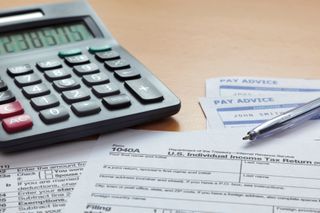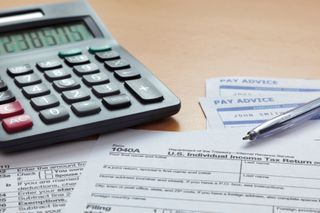Tax Resource Center

You lost your refund check. How do you get a new one?
You can request a Refund Trace with the IRS. The IRS will tell you what bank account the refund was deposited into, or, if a paper check was mailed, it will tell you if the check was cashed or not. If the check wasn't cashed, you'll receive a replacement check once the original check is canceled. If the refund check was cashed, the Bureau of the Fiscal Service will provide you with a claim package that includes a copy of the cashed check. Follow the instructions for completing the claim package. The BFS review can take up to six weeks to complete.
To initiate a refund trace, call IRS at 800-829-1954 (toll-free) and either use the automated system or speak with an agent. However, if you filed a married filing jointly return, you can’t initiate a trace using the automated systems. Download and complete the Form 3911, Taxpayer Statement Regarding Refund or the IRS can send you a Form 3911 to get the replacement process started.

What to do if you haven’t received your Form W-2?
1. Contact your employer to inquire if and when the Form W-2 was mailed. If it was mailed, it may have been returned to the employer because of an incorrect or incomplete address.
2. If you have already contacted your employer and no action was taken, you can call the IRS for assistance at (800) 829-1040. IRS will contact your employer for you and request the missing W-2 form.
3. You still must file your tax return or request an extension to file by April 18 even if you do not receive your Form W-2. If you have already completed steps 1 and 2 and still have not received your Form W-2, you may use Form 4852 (a substitute for Form W-2). Attach Form 4852 to the return, estimating income and withholding taxes as accurately as possible.
4. If after you filed your return using Form 4852 and received your missing Form W-2 and the information is different from what you have reported on your return, you must amend your return by filing a Form 1040X, Amended U.S. Individual Income Tax Return.

Do you have to pay taxes on a gift? Can you deduct gifts on your income tax return?
The person receiving a gift typically does not have to pay gift tax. The donor, however, will generally file a gift tax return when the gift exceeds the annual gift tax exclusion amount, which is $15,000 per recipient for 2021 ($16,000 for 2022). The donor may also not owe gift tax due to the basic exclusion amount. Generally, the following gifts are not taxable gifts.
- Gifts that are not more than the annual exclusion for the calendar year.
- Tuition or medical expenses you pay for someone (the educational and medical exclusions).
- Gifts to your spouse.
- Gifts to a political organization for its use.
Making a gift or leaving your estate to your heirs does not ordinarily affect your federal income tax. You cannot deduct the value of gifts you make (other than gifts that are deductible charitable contributions).

Are gambling winnings taxed? Can you claim gambling losses on your taxes?
Gambling winnings are fully taxable and you must report the income on your tax return. Gambling income includes but isn't limited to winnings from lotteries, raffles, horse races, and casinos. It includes cash winnings and the fair market value of prizes, such as cars and trips. You may deduct gambling losses only if you itemize your deductions on Schedule A (Form 1040) and kept a record of your winnings and losses. The amount of losses you deduct can't be more than the amount of gambling income you reported on your return.

Do you have to pay capital gains tax on a home sale?
It depends on how long you owned and lived in the home before the sale and how much profit you made.
- If you owned and lived in the place for two of the five years before the sale, then up to $250,000 of profit is tax-free.
- If you are married and file a joint return, the tax-free amount doubles to $500,000.
The law lets you exclude this profit from your taxable income.

Do you pay taxes on cryptocurrency?
The IRS classifies cryptocurrency as property, and cryptocurrency transactions are taxable by law just like transactions related to any other property. Taxes are due when you sell, trade, or dispose of cryptocurrency in any way and recognize a gain.
With the signing of the $1.2 trillion bipartisan infrastructure bill, new legislation will require brokers — aka cryptocurrency exchanges — to issue a Form 1099-B. This form will list your purchase price, sales price and the resulting gain or loss from your crypto transactions which you must report on your tax return.
We are not attorneys. Manila Central USA, Inc. is not a law firm. We can only provide self-help services at your specific direction. We cannot perform the services that an attorney performs and therefore cannot engage in the practice of law, represent you in court, advise you about your legal rights or the law and select forms for you. We cannot charge a fee for referral of the client to another for services that we cannot or will not perform. If you need legal advice and/or representation, you should contact an attorney or the State Bar of California for a referral. All information on this site are for general informational purposes only and does not, and is not intended to, constitute legal advice nor a substitute for legal advice. If you have any legal questions, you should seek the advice of an attorney. We assume no responsibility or liability for any loss, injury, claim, or damage related to your use of any information from this site, whether from errors or omissions in the content.
© Copyright 2024. All rights reserved. Manila Central USA Inc.
We need your consent to load the translations
We use a third-party service to translate the website content that may collect data about your activity. Please review the details in the privacy policy and accept the service to view the translations.

